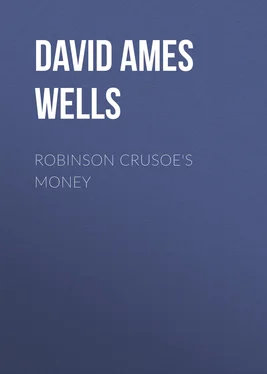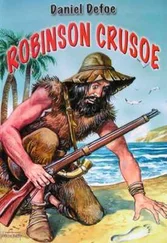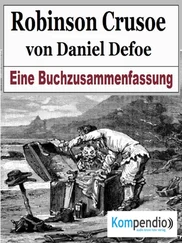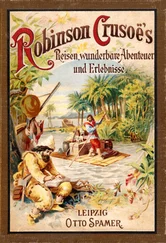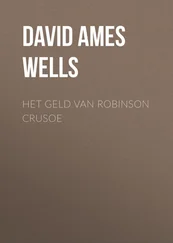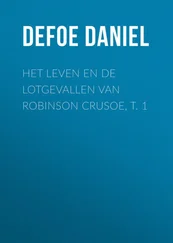David Ames Wells - Robinson Crusoe's Money
Здесь есть возможность читать онлайн «David Ames Wells - Robinson Crusoe's Money» — ознакомительный отрывок электронной книги совершенно бесплатно, а после прочтения отрывка купить полную версию. В некоторых случаях можно слушать аудио, скачать через торрент в формате fb2 и присутствует краткое содержание. Издательство: Иностранный паблик, Жанр: popular_business, foreign_edu, на английском языке. Описание произведения, (предисловие) а так же отзывы посетителей доступны на портале библиотеки ЛибКат.
- Название:Robinson Crusoe's Money
- Автор:
- Издательство:Иностранный паблик
- Жанр:
- Год:неизвестен
- ISBN:нет данных
- Рейтинг книги:4 / 5. Голосов: 1
-
Избранное:Добавить в избранное
- Отзывы:
-
Ваша оценка:
- 80
- 1
- 2
- 3
- 4
- 5
Robinson Crusoe's Money: краткое содержание, описание и аннотация
Предлагаем к чтению аннотацию, описание, краткое содержание или предисловие (зависит от того, что написал сам автор книги «Robinson Crusoe's Money»). Если вы не нашли необходимую информацию о книге — напишите в комментариях, мы постараемся отыскать её.
Robinson Crusoe's Money — читать онлайн ознакомительный отрывок
Ниже представлен текст книги, разбитый по страницам. Система сохранения места последней прочитанной страницы, позволяет с удобством читать онлайн бесплатно книгу «Robinson Crusoe's Money», без необходимости каждый раз заново искать на чём Вы остановились. Поставьте закладку, и сможете в любой момент перейти на страницу, на которой закончили чтение.
Интервал:
Закладка:
The following were some of the narrations which the children found and read out of their histories:
“In December, 1861, a poor soldier’s widow put into the savings-bank two hundred dollars in specie, and then removed with four young children to California. In July, 1864, when gold stood at two hundred and eighty, she sent for her money. In return, she received a gold draft for eighty-three, accrued interest at six per cent, included.”—Henry Bronson, Nature and Office of Money .
“The morals of the people were corrupted (by the Continental irredeemable money) beyond any thing that could have been believed prior to the event. All ties of honor, blood, gratitude, humanity, and justice were dissolved. Old debts were paid when the paper money was worth no more than seventy for one. Brothers defrauded brothers, children parents, and parents children. Widows, orphans, and others were paid for money lent in specie with depreciated paper.”—Breck, Sketch of Continental Money .
“The assignats gradually dwindled down to nothing, involving the whole land in ruin—excepting a few lucky speculators—and resulted eventually in national bankruptcy. When thousands of wretches, even before the final collapse of the assignats, were committing suicide to escape starvation, war was a blessing; and Napoleon was the instrument by means of which all Europe was made to feel the results of worthless money, either directly or by inoculation, from its maddened victims.”— Notes on the French Assignats, and their Influence.
“He had to pay four hundred dollars for a hat; for a pair of boots the same. He wanted a good horse, but was asked a price equivalent to ten years’ pay.” “My six months’ earnings will scarce defray the most indispensable outlay of a single day. * * * For a bed, supper, and grog for myself, my three companions, and their servants, I was charged, on going off without a breakfast next day, the sum of eight hundred and fifty dollars.”— Life of General De Kalb.
“In all, from first to last (1835 to 1841), the amount of notes, bills, drafts, bonds, etc., issued by the Treasury of the Republic of Texas, and serving to a greater or less extent as a ‘circulating medium,’ amounted to $13,318,145, or at the rate of more than two hundred and sixty dollars per head of the entire population. If paper issues serving as money could have made a people rich, the Texans ought to have been the richest people in the universe. In January, 1839, Texas treasury-notes were worth no more than forty cents on the dollar ; in the spring of 1839, they were worth thirty-seven and a half cents; in 1841, from twelve to fifteen cents; and in 1842 it required, in the characteristic language of the times, ‘fifteen dollars in treasury-notes to buy three glasses of brandy-and-water without sugar.’ ‘By this time there was little circulating medium of any kind in Texas; but this was no great calamity, as the people had but little left to circulate.’ The evils the system did were immense, and such as for which, even were it so disposed, the Government could afford no compensation to the sufferers.”—Gouge’s Fiscal History of Texas .
Again, one of the principal objects for which money was devised and brought into use was to serve as a measure, or standard, for estimating the comparative value of other things. But it seems hardly possible to conceive of a person desirous of using money for such purpose, selecting an article to measure values which in itself possesses no value, or costs no labor to produce, any more than he would select as a standard for measuring length something which had no length, or as a standard for measuring weight something which had no weight. The people of the island must have been unusually stupid if they did not from the outset, therefore, clearly see that nothing can be reliable and good money under all circumstances which does not of itself possess the full amount of the value which it professes on its face to possess.
Chapter V.
How the People on the Island and Elsewhere Learned Wisdom
But while any commodity possessed of acknowledged purchasing power or value may be used as money, the experience of the islanders and every other people must have soon taught them that some commodities are much better adapted to this purpose than others; or, rather, that the use of certain commodities as money, while they may answer the purpose, nevertheless entail very serious disadvantages. And the details of the manner in which this information has been acquired by experience constitute one of the most interesting chapters in the world’s history. The experience of the islanders was somewhat as follows:
At the outset they agreed to use cowries—a pretty shell picked up on the beach, and which the women all desired to have and use as an ornament. These shells were not, however, plentiful; and, in fact, it was found that it required about as much time and labor for a man to collect a hundred of them as it did to grow a bushel of wheat. Consequently, wheat regularly exchanged for cowries (as money) at the rate of one hundred cowries for one bushel, while the farmer with two thousand cowries could readily buy a plow, which was considered equivalent in value to twenty bushels. By-and-by, some idle fellows that were in the habit of sailing made a long excursion, and, for the first time, visited a little island on the remote horizon. When they landed, they found, to their surprise, that instead of cowries being very scarce on the beach, they were very abundant. They winked at one another, and said little; but each man proceeded to gather all the cowries he could, and, returning to the main island, kept their discovery a profound secret.
The first thing of note that next happened among the Robinson Crusoe people was a great and unexpected revival in business. Money began to grow abundant. Societary circulation was never so active. Every thing that was offered for sale speedily found a purchaser, and, demand increasing, prices rapidly increased also. It was also noticed that a few persons who never did any regular work, but speculated and gambled all the morning, and took pleasant sailing excursions every afternoon, had, especially, plenty of money, which, as patriotic citizens, desirous of making trade lively, they were always most ready to part with for other commodities. The shop-keepers, the farmers, and the mechanics, all also finding that they had more money than usual, all also felt impelled to buy something, and prices took a fresh start upward, so that a bushel of wheat that could previously have been sold for one hundred cowries easily brought one hundred and fifty, and even two hundred. But, on the other hand, the farmer, instead of being able to buy, as before, a plow for two thousand cowries, now found that he had to pay double, or four thousand; or, in other words, the cowries had only about one-half the purchasing power they possessed before.
But for a time every body was jubilant. Was it not evident that the value of every man’s possessions, measured in cowry money, had greatly increased—and what could be more natural than that the shrewd adventurers who had been the authors of these golden days should be highly honored, invited to speak before cowry clubs in all parts of the island, and be even talked of for the chief offices, which still continued to be filled by Robinson Crusoe and his man Friday? The continually augmenting prices—measured in cowry money—of all commodities, or, what is the same thing, the continually diminishing purchasing power of the cowries, at last began to attract attention, and this in turn induced distrust; so that the price of a bushel of wheat, which had been at first one hundred cowries, and then two hundred, rose to three, four, and even five hundred cowries. Another remarkable circumstance noticed was, that, as prices increased, the wants of trade for cowry money also increased proportionably, which want the adventurers who had been the means of giving the island its increased volume of money took care to supply by bringing additional quantities of cowries as they were needed. It was also observed that, as distrust increased, there was also a remarkable increase in societary activity; for every body desired to change off his cowry money for something else. 3 3 “To my mind, the great and immediate need of the day is the issuance of more legal-tender notes, in order to impair the confidence in them to an extent as to cause the owners of them to desire to exchange them for other kinds of property, or man’s wants—not simply to loan out on short or long date paper, with fire-proof security, at low or high rates of interest, which can now be done to any extent required—but absolutely part with them for other kinds of property.”— Views of Enoch Ensley, of Memphis, Tennessee, on the National Finances , Memphis, September, 1875.
Persons who were in debt made haste to pay their debts, and every body was ready to lend cowry money to start all sorts of new enterprises. A company was organized, for example, with a capital of ten million cowries, to explore the wreck of the original ship which brought Robinson Crusoe to the island; and although nobody knew exactly where the wreck was, or what was supposed to remain in it, it was advocated as affording great opportunity for labor. Another project, for which a company with fifty million cowries capital was started, was to build a system of canals across the island, although the island had a width of only about ten miles, with a remarkably safe ocean navigation all around it.
Интервал:
Закладка:
Похожие книги на «Robinson Crusoe's Money»
Представляем Вашему вниманию похожие книги на «Robinson Crusoe's Money» списком для выбора. Мы отобрали схожую по названию и смыслу литературу в надежде предоставить читателям больше вариантов отыскать новые, интересные, ещё непрочитанные произведения.
Обсуждение, отзывы о книге «Robinson Crusoe's Money» и просто собственные мнения читателей. Оставьте ваши комментарии, напишите, что Вы думаете о произведении, его смысле или главных героях. Укажите что конкретно понравилось, а что нет, и почему Вы так считаете.
